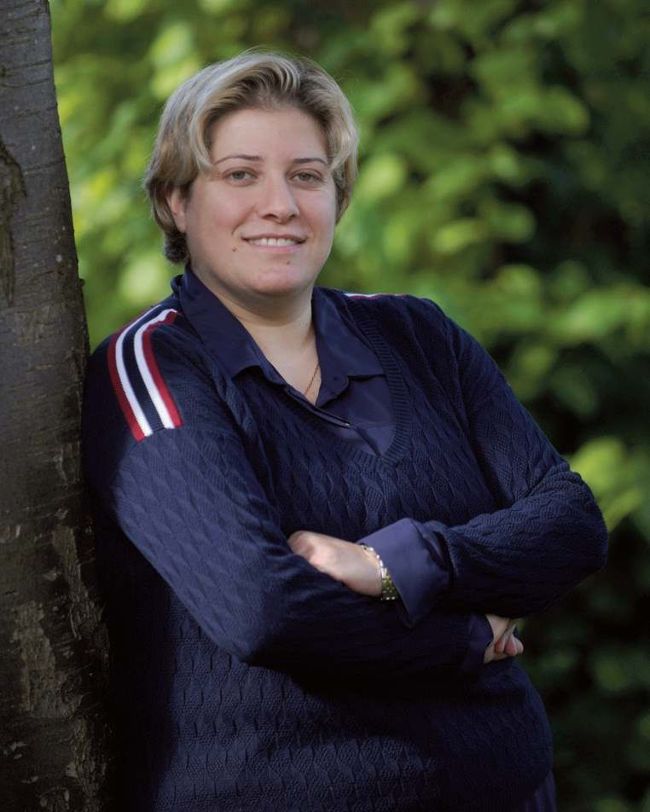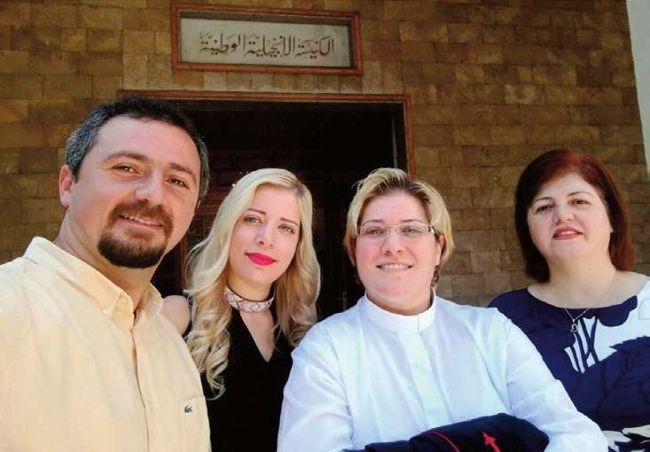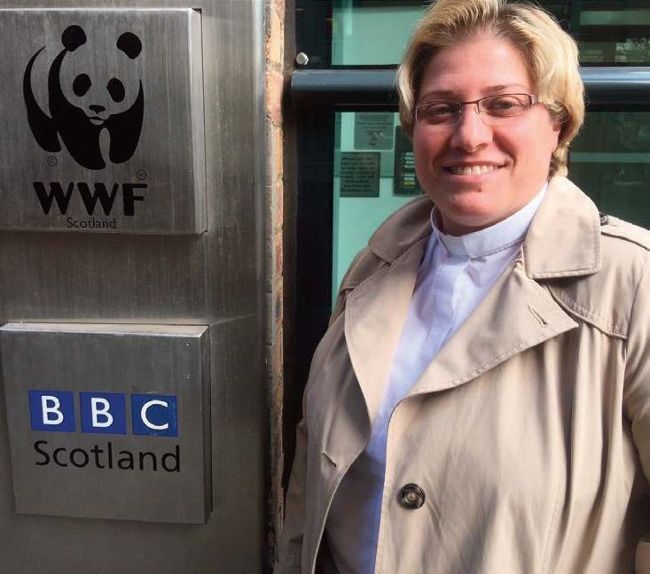The accidental trailblazer
Thomas Baldwin meets the Rev Rola Sleiman, the first Christian woman minister ordained in the Middle East.
PROFILE
ROLA Sleiman is an accidental trailblazer. In simply seeking to serve God, she didn’t ask and never hoped to be the first female Christian minister to be ordained in the Middle East.
“If you’d asked me 10 years ago, would there be a female pastor in the Middle East, I would have said maybe in 100 years,” she says. “It was impossible. We are living in a patriarchal society where a woman is not treated equally in any profession.
“It was a dream for some of my female colleagues, but to me it wasn’t practical. We didn’t have female pastors. Why dream something that isn’t reality?”
But God had other ideas, which came to fruition with Rola’s ordination in February this year.
“God has a plan and if it is God’s will it is going to happen,” says the 42-year-old minister of a Presbyterian church in her hometown of Tripoli, in northern Lebanon. While she admits she had her doubts the night before, she says: “The feeling of peace and joy I felt during the ordination cannot be explained. To me this was the assurance that it really was the will of God.”
Rola’s path to this point has been far from smooth, but characterised by a stubbornness, a strong conviction in her calling and a refusal to give up in the face of any obstacle placed in front of her.
The daughter of a Lebanese mother and Syrian father, both nurses, she grew up in Lebanon but didn’t have citizenship (she has a Syrian passport), and for the first 15 years of her life the country was in civil war.
“I grew up not as normal children grew up,” she says. “We never played outside, or went to a park for example. I remember my parents listening to the daily news at 8pm and there are still some bad images of people being shot or burnt that haunt my mind.
“No one wins in a war, everybody loses. I still remember when my family used to rush us to a shelter to spend a safe night there.”
Her parents were not strongly religious, but they were members of the Evangelical Presbyterian church, and Rola and her brother and sister were encouraged to go to Sunday School there.
She came to faith in her teens after a period of questioning, and at 17 she applied to be adopted by the National Evangelical Synod of Syria and Lebanon to study theology. They refused.
“It was one of the biggest shocks of my life,” she says. “I still have the letter. It said ‘we appreciate the belief but we feel you still need some experience’. So they felt I wasn’t mature enough, that my decision was an emotional one but not so serious.
“It was the most painful period for me, because I really wanted to serve the Lord and I thought to myself at that time, how can they not allow me to serve Him?”
However, her father, who had always encouraged his children’s education, agreed to pay her university fees anyway. She was accepted to study at the American University in Beirut, one of the most prestigious in the Middle East, but instead chose to go to the Near East School of Theology, also in Beirut.
“So I went, and I studied for a year and a half, and I went to all the camps and all the services; and after a year and a half the general secretary of the Synod came and said: ‘We feel you are really serious about this. Can you write a letter again?’.
“I said: ‘I wrote once and I got an answer. I’m not going to write again’.”
Despite that, she was called to the next meeting of the synod, and told that they appreciated her persistence and that she would be adopted.
She graduated in 1997 and served initially as a Christian educator in two schools and three churches four hours away from Tripoli. She says that this period was a bad one for women in the church, who saw their salaries cut and the Synod refusing to appoint them to a church unless they were specifically asked for.
After four years she was asked by her own church and her old school in Tripoli whether she would go there, again as a Christian educator. She had other options, but she says she felt a strong calling to return home. “I felt there was something that I had to do here, in my hometown… I just felt that I had to go,” she said in an interview with Al Jazeera last year.
The church, in the centre of the old city, is a small one, with about 85 members. Presbyterianism is a minority denomination in a minority religion in Lebanon: the country is Muslim-majority, and of the Christians most are Orthodox or Roman Catholic. Tripoli, Lebanon’s second city, lost most of its Christian population during the civil war, and Christians now make up around six per cent of the population (the figure is 30 percent for Lebanon as a whole) although Rola says the church gets on well with the mostly Muslim community around it. “The main challenge to us is emigration. Christians in the Middle East always strive for a better future for their kids. We lost more than half the church’s families that way.”

Rola Sleiman by Esme Allen
To me, I was a Christian educator, and I was fine taking some part in the preaching. Maybe this played a role, because it wasn’t my goal to reach a certain position– my goal was to serve the Lord.
At the point when Rola returned to the city, she says, there was still no question of being ordained, despite there being nothing in the church’s rules against it.
“To me, I was a Christian educator, and I was fine taking some part in the preaching. Maybe this played a role, because it wasn’t my goal to reach a certain position –my goal was to serve the Lord.
“I didn’t want the spotlight on me.”
However, she found herself in the spotlight anyway, after the church’s pastor left for North America, initially for nine months and later permanently.
“Automatically, every week, one of the elders would come to me and say ‘you have studied theology, can you preach this Sunday?’ And I would say ‘okay’, and I’d prepare and preach, and then next Sunday it would be ‘can you do it?’ again. If you go to the documents of the Synod, they say at that time nobody was serving the church as a pastor. I wasn’t appointed.”
This went on, with Rola serving as an unofficial pastor (with male supervision when it came to the sacraments), until 2008, when the church needed to provide a representative for the Synod administrative committee. This would normally have been the minister, but the committee refused to accept her.
The role of the Church of Scotland is extremely important, as a supporting church, as a church which has been ordaining women for years now, so they can share and encourage other churches concerning this specific side of ministry.
“The church said ‘she does everything as a pastor, so she should be (on the committee)’. They said ‘she’s not appointed as a pastor, so legally she cannot be’. “And then a colleague, the Rev Dr Hadi Ghantous, pastor of another church in the north, said: ‘if she was appointed, would she be on the committee?’ They said ‘yes’, but in their mind this wouldn’t happen. So he went back to the church in Tripoli and said ‘would you hold a meeting and ask for her?’
And they said yes, and it was a 100% vote. “The decision was taken without my knowledge. I was sitting in my office when they called me to tell me. It was a huge step back then.”

Rola Sleiman at her church in Tripoli
After that, she served as the appointed pastor, with a licence to preach but still not ordained, until last year, when the elders at her church wrote a letter to synod asking for her ordination. “I didn’t push them to take the decision,” she says. “I was a bit cautious that this step might bring a lot of criticism because the whole issue was new. The Synod were faced for the first time in their history to decide whether they will ordain a woman or not.”
She needn’t have worried: her ordination was approved almost unanimously, by 23 votes out of 24.
While she says she hasn’t had any opposition at all in her own church, she acknowledges there is opposition to her appointment from other churches in the region. “For sure, it happens and will happen. I respect different opinions,” she says.
Rola is very matter-of-fact about her situation, but she was aware of the enormity of the decision, and the fact that it would open doors for others (following her ordination in February, another woman was ordained within 40 days). She told Al Jazeera: “The title hasn’t added to anything I wasn’t already doing. On the other hand, I feel there are so many more eyes on me, like people are waiting either for me to succeed or fail.”
She found herself in the spotlight again, in Scotland this time, in May, when she was initially refused a British visa to travel to the General Assembly of the Church of Scotland. She says: “The negative decision wasn’t a shock since I hold a Syrian passport, but the shock was the reasons stated in the refusal letter. When I read the refusal letter, I felt so sad and humiliated. They doubted my honesty, they didn’t believe that I would be in the UK to attend the General Assembly and they didn’t believe I would come back to my country, and they mentioned something about me not being able to cover my expenses during my stay.
“I never thought the Church of Scotland would pressure so seriously and efficiently the government and the Embassy to change its decision, I appreciate what has been done and I am full of gratitude to know I have sisters and brothers in Christ from a different part of the world, who can stand behind me and back me.”
Although the Home Office was persuaded to reverse its decision, Rola was ultimately prevented from travelling at the airport in Beirut. However, she did make it to Scotland for the Women in the World Church conference in September, hosted by the Church’s World Mission Council.
She said: “The experience was a great one, I was in touch with many influential people, great ministers, powerful women from every part of the world. It was days I will never forget in my life. I was so respected and appreciated.
“The role of the Church of Scotland is extremely important, as a supporting church, as a church which has been ordaining women for years now, so they can share and encourage other churches concerning this specific side of ministry.”
She says she hopes for the day when the church worldwide looks at the spiritual talents of a person rather than their gender.
“The role of women is very important in the life of the church, as it was important and influential to Jesus and the history of the church. The church can’t improve and grow without the role and ministry of women.
“Stop talking about ‘this is a woman minister, she has to work hard to prove herself ’. We are ministers, and we are either qualified or we are not.”

Rola’s recent visit to Scotland by Helen Silvis
The role of women is very important in the life of the church, as it was important and influential to Jesus and the history of the church.